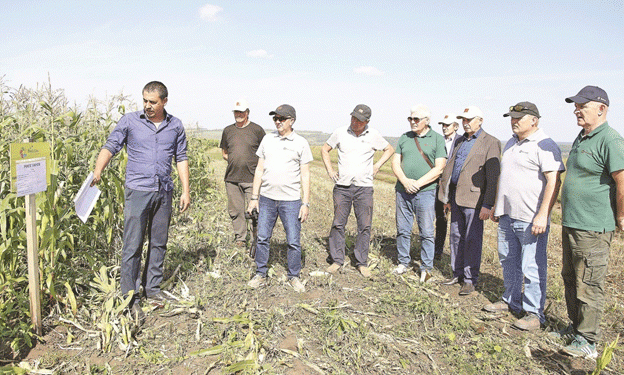In the agricultural heartland of the Birskiy district, a recent seminar brought together agronomists and farmers to discuss advancements in corn cultivation. Organized by the agrochemical company “Pesticides RU,” the seminar aimed to provide farmers with actionable insights on hybrid corn varieties and their potential in the region. Held at the “Avangard” farm, led by Alexander Sokolov, this event highlighted the growing importance of efficient corn production as a vital part of the local agricultural economy.
Corn cultivation in the Birskiy district has increasingly focused on hybrid varieties that are specifically tailored to regional conditions. One of the key takeaways from the seminar was the presentation of several hybrid corn varieties, including the “Ross-140,” “Ross-130 F1,” “Prokhladenskiy 175 SV F1,” “Agata SV F1,” and “Rodnik-180 SV F1,” among others. These hybrids have been selected based on their high adaptability, resilience to local climate conditions, and potential for high yields.
Agronomist Rael Safiullin from “Pesticides RU” explained the rigorous process of testing these hybrids on 250 hectares, with 10 hectares dedicated to demo plots. These demo plots are crucial for assessing the performance of different hybrids in the specific conditions of the Birskiy zone. The results so far have been promising, with the “Ross-130” hybrid standing out. This variety, with a plant height of 220 cm and a green mass yield of 430 centners per hectare, showed excellent potential for both silage and grain production.
One of the central themes discussed during the seminar was the importance of timing in corn cultivation. The “Ross-130” hybrid, for example, was sown between May 18 and 25, but it was recommended to start planting earlier, around May 10, to mitigate risks from spring frosts and ensure proper development before the fall chill. Corn, being a heat-loving crop, requires ample sunlight, but its growth primarily occurs at night. Therefore, understanding the photoperiod and optimizing planting schedules is crucial for maximizing yield.
Another critical factor in hybrid selection is the height of the corn cob attachment on the stalk. Safiullin emphasized that in dry years, cobs that are attached too low can lead to increased harvest losses, as harvesting equipment may not be able to cut the stalks low enough. This practical insight is particularly valuable for farmers looking to optimize their yields in challenging weather conditions.
The discussion also extended to the economic feasibility of corn cultivation. While most of the harvested corn is used for animal feed, excess production can be sold as grain, providing an additional revenue stream for farmers. Corn is especially beneficial in pig farming, as introducing it into the feed base can reduce the fattening period by 20 days, significantly increasing the productivity of the farm.
Eugene Chernikov, chief livestock specialist at “Avangard,” added that after the corn reaches the wax maturity phase, it is processed into a high-protein feed known as “cornage.” This feed, made from the cob and covering leaves, is highly nutritious and less acidic than silage, making it suitable for feeding not only pigs but also horses.
As the seminar concluded, Rael Safiullin summed up the importance of their work: “We work on the land to ensure that our fields yield harvests, regardless of the weather. Our goal is to provide food security for our country.” His words echo the broader sentiment within the agricultural sector, which continues to thrive despite external challenges. This resilience is a testament to the dedication of farmers and the continuous modernization of agricultural practices.
The seminar in Birskiy district highlighted the ongoing efforts to improve corn cultivation through the use of hybrid varieties and modern agricultural techniques. By focusing on optimizing planting schedules, selecting appropriate hybrids, and maximizing economic returns, local farmers are better equipped to contribute to regional food security. As agriculture in the region continues to evolve, events like these play a crucial role in ensuring that farmers have the knowledge and tools to succeed.
Error




